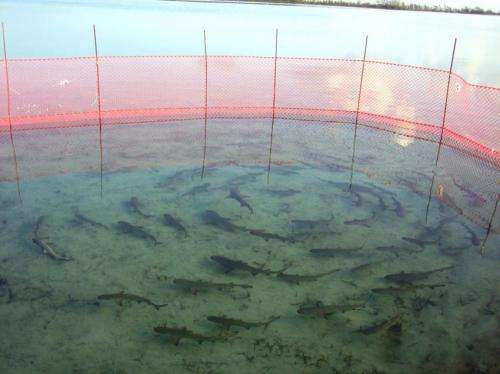(Phys.org)—In a recent experiment conducted at the Bimini Biological Field Station Foundation, Bahamas, researchers designed a novel foraging task to determine that juvenile lemon sharks could learn from each other.
The researchers allowed untrained sharks to interact with, and observe either a pre-trained or an inexperienced peer. When they compared the performances the results showed that sharks working with a trained partner could complete tasks more quickly and successfully.
"The general perception of sharks as solitary, mindless, feeding machines with pea-brains couldn't be further from the truth. This research clearly shows that lemon sharks have the ability to learn from each other's behaviour," says Culum Brown, Macquarie University.
The study is thought to be the first to demonstrate social learning in any cartilaginous fish. These results indicate that juvenile lemon sharks, like numerous other animals (primates, birds, insects and mammals), are capable of using social information to learn about novel features in their environment.
This research enables scientist to understand how sharks find and capture food, travel and avoid predators. Scientist say these findings are likely to have important implications for fisheries and ecotourism, as well us general perceptions about sharks.
"These exciting behavioural findings mean that the 'mindless, solitary feeding tag' that sharks previously endure is quickly losing momentum. We hope soon it will be replaced with descriptions like 'social and complex' and will lead to changes in public perception and conservation attitudes towards sharks," says Brown.
More information: Social learning in juvenile lemon sharks, Negaprion brevirostris, ANIMAL COGNITION, 2012, DOI: 10.1007/s10071-012-0550-6
Abstract
Social learning is taxonomically widespread and can provide distinct behavioural advantages, such as in finding food or avoiding predators more efficiently. Although extensively studied in bony fishes, no such empirical evidence exists for cartilaginous fishes. Our aim in this study was to experimentally investigate the social learning capabilities of juvenile lemon sharks, Negaprion brevirostris. We designed a novel food task, where sharks were required to enter a start zone and subsequently make physical contact with a target in order to receive a food reward. Naive sharks were then able to interact with and observe (a) pre-trained sharks, that is, 'demonstrators', or (b) sharks with no previous experience, that is, 'sham demonstrators'. On completion, observer sharks were then isolated and tested individually in a similar task. During the exposure phase observers paired with 'demonstrator' sharks performed a greater number of task-related behaviours and made significantly more transitions from the start zone to the target, than observers paired with 'sham demonstrators'. When tested in isolation, observers previously paired with 'demonstrator' sharks completed a greater number of trials and made contact with the target significantly more often than observers previously paired with 'sham demonstrators'. Such experience also tended to result in faster overall task performance. These results indicate that juvenile lemon sharks, like numerous other animals, are capable of using socially derived information to learn about novel features in their environment. The results likely have important implications for behavioural processes, ecotourism and fisheries.
Journal information: Animal Cognition
Provided by Macquarie University






















